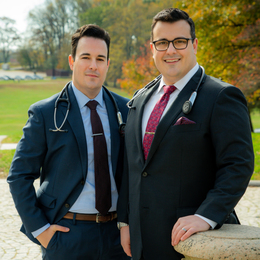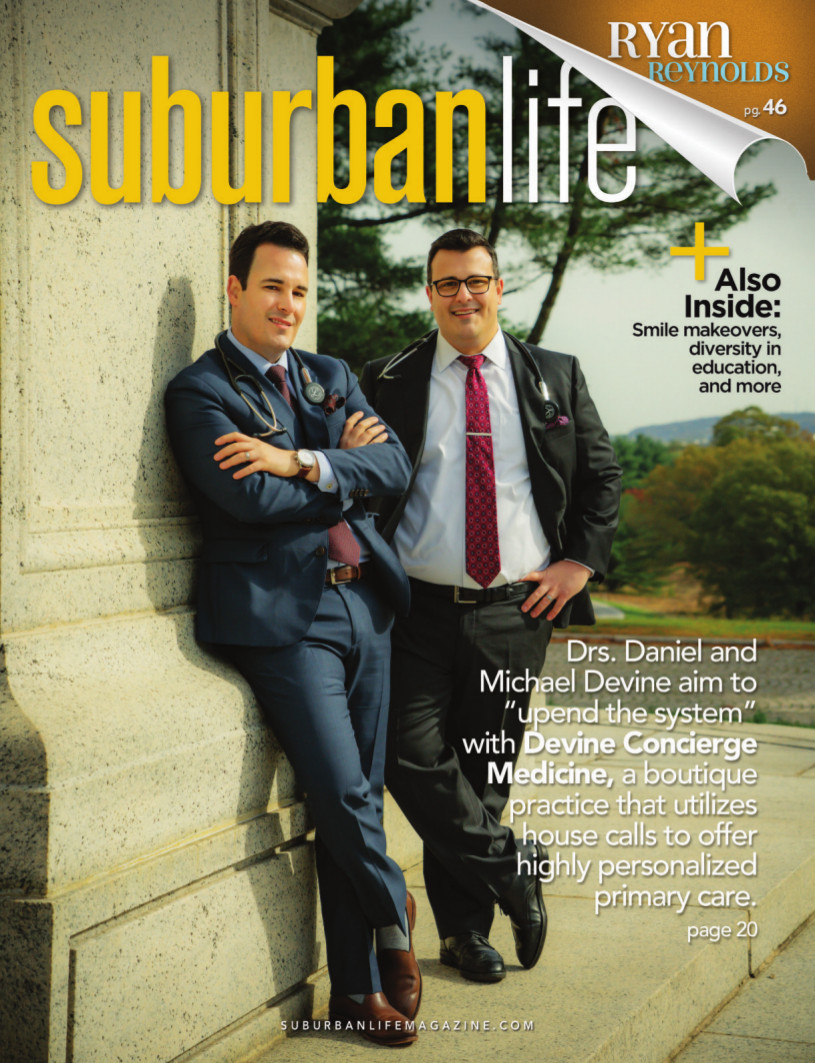
Devine Intervention
Drs. Daniel and Michael Devine aim to “upend the system” with Devine Concierge Medicine, a boutique practice that utilizes house calls to offer highly personalized primary care.
Once they became doctors, brothers Daniel J. Devine, M.D., and Michael S. Devine, M.D., began working to achieve another lifelong dream: to practice medicine together. They have done so by reviving a mode of primary care that defies the traditional, largely depersonalized approached to health care in the United States: the house call.
The heyday of the house call ended in the 1950s, as medicine transitioned into private practice. While early private practices strived to keep the doctor/patient relationship intact, the commoditization of health care has since resulted in clogged waiting rooms and limited interaction between doctor and patient. Having witnessed this depersonalization firsthand, the Drs. Devine saw a need to revive the classic house-call model and provide primary medical care the way they envisioned when they first decided to become doctors.
As the Devine brothers went through medical school (Drexel University and St. George’s University, respectively), residencies (Thomas Jefferson University Hospitals and Penn State College of Medicine), and fellowships (Massachusetts General and Johns Hopkins), it became abundantly clear to them that the traditional way of practicing primary care catered less to patients and more to insurance companies. That’s why the Drs. Devine chose to start their own “boutique” medical practice called, fittingly, Devine Concierge Medicine.
“The highly fractionated, depersonalization of medicine that we experienced both as providers and as patients was disheartening,” says Dr. Michael. “We really wanted a way that we could upend the system. We felt a concierge service was the way to do that.”
Devine Concierge Medicine brings personalized primary care medicine directly to patients from the Main Line and beyond. The doctors’ areas of expertise include geriatrics and internal medicine, meaning they can effectively treat adult patients from all points of the age spectrum.
The boutique model allows the type of personalized care that many patients might find difficult to imagine. While the average primary care physician struggles to care for thousands of patients, Devine Concierge Medicine accepts only 200 patients per physician so they can focus on getting to know each and every patient. That means patients receive more face-to-face time with their physician; an average house call lasts approximately one hour.
“When we’re able to spend an hour with a patient on a visit, we can really get much deeper into the nuts and bolts of what’s driving the disease process,” says Dr. Daniel. “That means we’re able to practice more preventative care and keep people out of the hospitals. You can’t accomplish that with the current healthcare system where insurance forces the typical primary care practice doctor to see more than 20 patients in a day.”
Dr. Michael agrees. He suggests the individualized attention he and his brother are able to provide enables patients to experience better overall health.
“With increased communication and also being able to see the patient in his or her home environment, we’re often able to get ahead of problems,” he adds. “Instead of waiting until the point where the patient is so sick that there’s nothing left to do but treat with medications or hospitalization, we’re focusing on true preventative medicine. By being proactive, we can get ahead of things before they get serious.”
The doctors consider this form of care like an “ongoing conversation,” as opposed to the way patients usually treat a visit to the doctor—that is, holding off on addressing a concern until they can wait no longer. With the Devine Concierge Medicine model, patients are in touch as often as they want or need to be. In the process, they become anything but “just a number” in a system.
“We might see a patient on Monday at their home but by the weekend they have another question, so they text us,” Dr. Michael explains. “Our goal is to be able to provide care instantaneously. We want our patients to feel that they have no barrier standing in the way of getting in touch and receiving care.”
The logistics are simple. Patients pay a monthly retainer fee and that gives them open access to their doctor. That includes house calls and telemedicine, as well as texts and phone calls. As a membership-based model, the doctors say they purposely limit the number of patients they accept in a given year. That means patients can be guaranteed a same-day response. The doctors see it as an important step toward restoring the sanctity of the doctor-patient relationship in an era driven by efficiency and insurance requirements.
“Nobody wants to waste a half a day at the doctor’s office, so we can also see our patients in their offices at work if they want us to,” Dr. Daniel says. “This isn’t a 9-to-5 service, either. We are a 24/7, 365-day service that aims to meet our patients’ lifestyle.”
The brothers describe the mission of their practice as delivering the best possible care to each patient. They believe this boutique service is truly the best way to deepen trust between providers and their patients.
“We’ve found that when we can form strong patient/doctor bonds, that we can actually return to that model of preventative care that’s so difficult to achieve in a healthcare model that’s focused on seeing as many patients as possible,” Dr. Daniel says. “This is the kind of care that we’d want our own family members to receive. It’s the kind of care that we envisioned practicing when we both went to medical school. It’s what remains our guiding light.”
For more information on Devine Concierge Medicine, visit devineconciergemedicine.com or email hello@devinemd.com.
Photograph by Jody Robinson
Published (and copyrighted) in Suburban Life magazine, November 2020.



